The next medium size axe I want to review is the Council Tool Hudson Bay Camp Axe (manufacturers code 175HB28). It has proven to be an excellent tool from a company that deserves a closer look. For some of the pictures the paint has been removed from the head to provide for a better look.

Specifications:
Manufacturer: Council Tool Co. Inc.
Axe Head Weights: 1.75 lb
Axe Length: Advertised as 28 inches; measured as 26 inches
Axe Head Material: Carbon steel, HRC 48-55 on the Rockwell scale
Handle Material: Hickory
Cost: $47.00
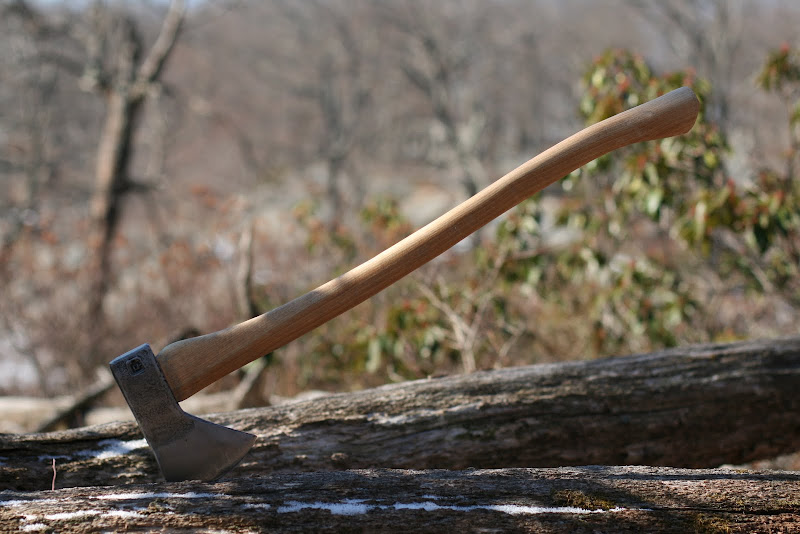
This is a mid range axe, both in size and price. It is one of the few axes left that is manufactured in the United States from a company that is very responsive to the customer and offers a wide range of products.
In this review I will be comparing the Council Tool Hudson Bay Camp Axe to the Gransfors Bruks Scandinavian Forest Axe. Here you can see the two axes next to each other.
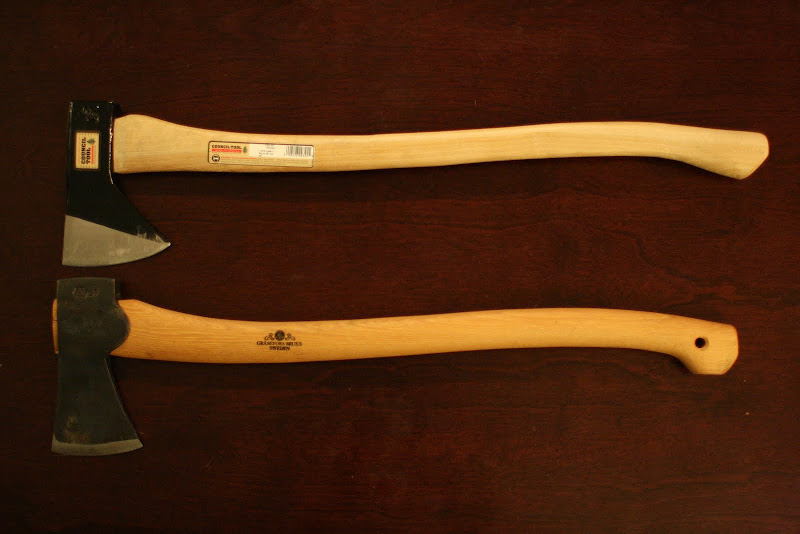
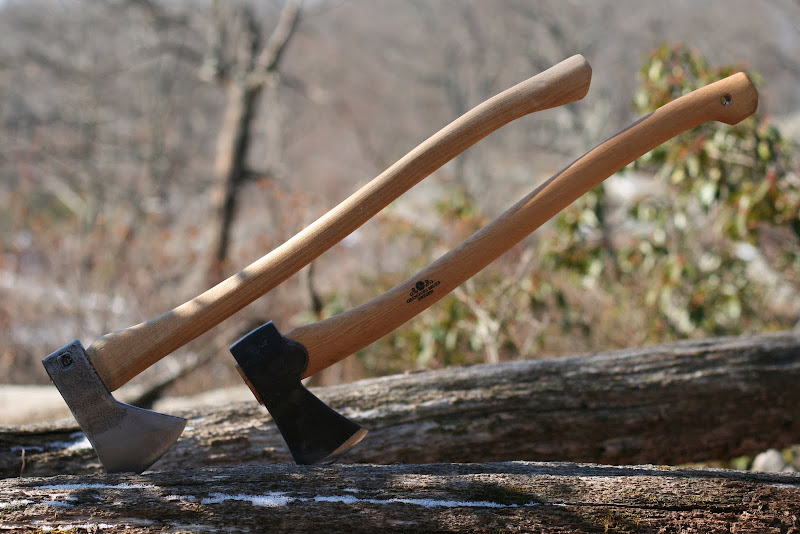
The handle of the Council Tool Hudson Bay Camp Axe is an inch longer than that of the Gransfors Bruks Scandinavian Forest Axe, making it exactly 26 inches long. Even though the axe is officially advertised as being 28 inches long, a closer look at the description on the Council Tool website reveals that during the hanging process, two inches is removed from the handle.
The grain of the handle on the axe I purchased (left) is very poor. It is not the worse I have seen, but if I was planning on using this axe as my main cutting tool, I would certainly put on a new handle. There did not appear to be any polish or finish of any sort on the handle. I had to oil it before use. Other than that, the handle is very comfortable, and quite slim even when compared to that of the Gransfors Bruks Scandinavian Forest Axe, making for a very streamlined axe.
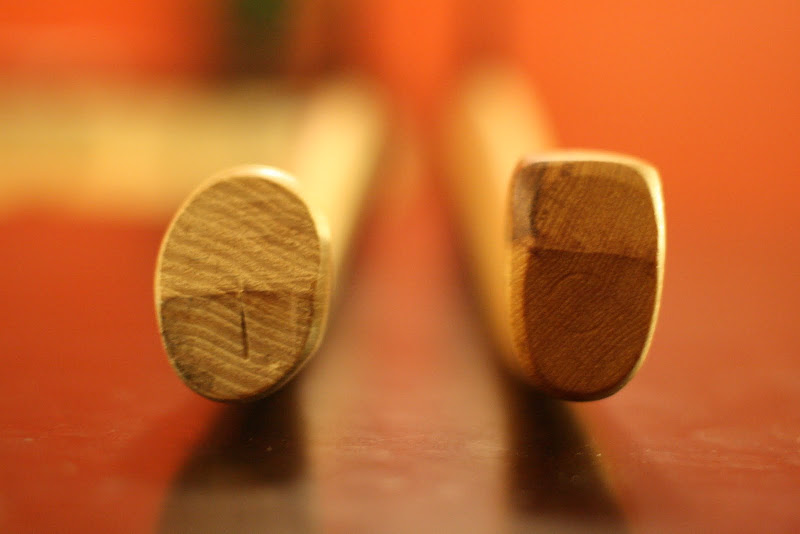
The head of the Council Tool Hudson Bay Camp Axe weighs 1.75 lb, making is a quarter of a pound lighter than that of the Gransfors Bruks Scandinavian Forest Axe. It is attached to the handle using one metal wedge. At first the connection seemed flimsy to me, but through all the testing, the head remained securely in place. The head is well shaped. The cheeks are fairly thin, and the convex of the cutting edge is just a bit thicker than that of the Gransfors Bruks Scandinavian Forest Axe. The part I dont like about the head is the abrupt transition of the cheeks when they reach the eye. Instead of providing for a continuous curve, they almost form an angle to the eye, which would impede efficient chopping.
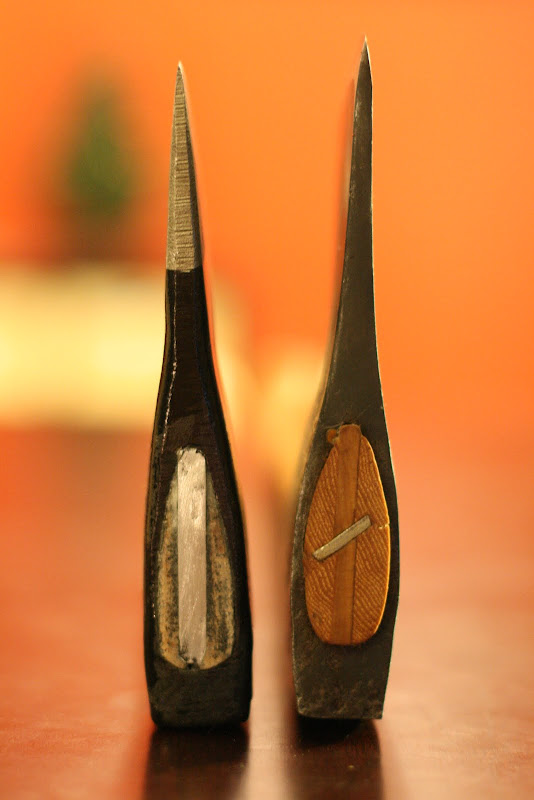
The head is a Hudson Bay style, and has a very large bit, providing form more cutting surface than the Gransfors Bruks Scandinavian Forest Axe.

The balance of the axe is not great, but is also not too bad. Ideally the head would stay horizontal to the ground when balanced like it is in the picture. As you can see, the bit hands lower than the rest of the head, meaning the poll is too light. The balance of an axe is important when we are talking about mid or full size axes because it contributes to the accuracy of the axe.

The axe came with no sheath.
When the axe arrived, it was not as sharp as I needed it to be. About ten minutes with the file and a sharpening stone, put a paper cutting edge on it. As I mentioned, the convex of the cutting edge was a bit thicker than that of the Gransfors Bruks Scandinavian Forest Axe. I got the urge to thin it out. It took me another thirty minutes with the file, and fifteen minutes with the sharpening stone to create the edge I wanted. When I was done, I took it out for testing.
The performance of the Council Tool Hudson Bay Camp Axe was surprisingly good. When it came to chopping, even though the Council Tool Hudson Bay Camp Axe is a quarter of a pound lighter than the Gransfors Bruks Scandinavian Forest Axe, it kept up with it, and even slightly outperformed it (results in the picture are after 25 swings). This is probably a result of the larger bit and slightly longer handle. Keep in mind, that if I had not thinned out the bit, the axe would not have performed as well, although it would have been quite acceptable.
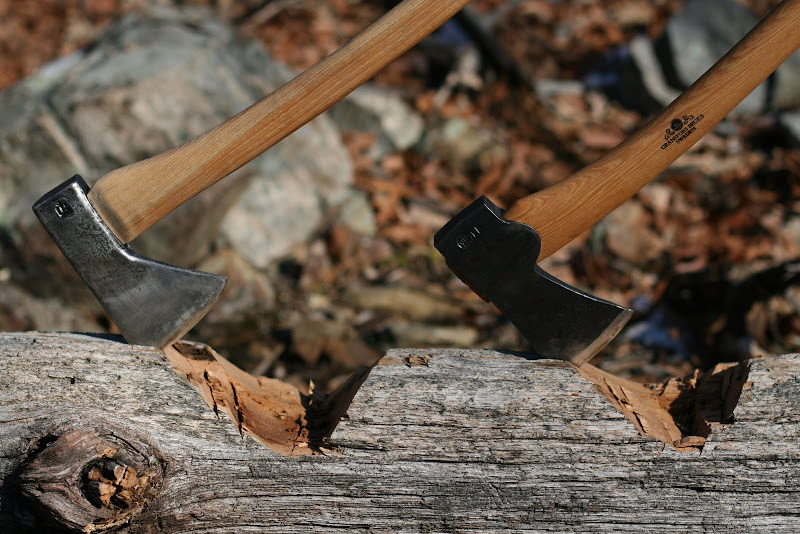
When it comes to splitting, the Gransfors Bruks Scandinavian Forest Axe should in theory outperform the Council Tool Hudson Bay Camp Axe because of the abrupt transition in the head of the Council Tool axe, but honestly, I was not able to see a difference. The truth is that with axes this size, you would need to split some very large logs to be able to see differences in performance. When it comes to bushcraft, logs that size would be very hard to find.
Overall, this is a very good axe, considering the price tag. It is not perfect by any means, but with some work, it can be turned into a very well performing tool. It is also light enough that the head can be used on a shorter, more portable handle. I would love to see it on a 24 inch. Council Tool also makes the same head with a 18 inch handle. I did not use it however because I have found such handles to be too short, especially because they are shortened even further in the hanging process.
There has been some talk from Council Tool that they will be releasing a bushcraft version of the Hudson Bay Camp Axe, which will have a non painted head, and be more highly finished. It would certainly be worth a look if the trice tag can be kept low enough.
As far as I know, the manufacturer produces additional bushcraft appropriate axes, which are too numerous to list here, but include Hudson Bay, Jersey, and Dayton patterns.
Specifications:
Manufacturer: Council Tool Co. Inc.
Axe Head Weights: 1.75 lb
Axe Length: Advertised as 28 inches; measured as 26 inches
Axe Head Material: Carbon steel, HRC 48-55 on the Rockwell scale
Handle Material: Hickory
Cost: $47.00
This is a mid range axe, both in size and price. It is one of the few axes left that is manufactured in the United States from a company that is very responsive to the customer and offers a wide range of products.
In this review I will be comparing the Council Tool Hudson Bay Camp Axe to the Gransfors Bruks Scandinavian Forest Axe. Here you can see the two axes next to each other.
The handle of the Council Tool Hudson Bay Camp Axe is an inch longer than that of the Gransfors Bruks Scandinavian Forest Axe, making it exactly 26 inches long. Even though the axe is officially advertised as being 28 inches long, a closer look at the description on the Council Tool website reveals that during the hanging process, two inches is removed from the handle.
The grain of the handle on the axe I purchased (left) is very poor. It is not the worse I have seen, but if I was planning on using this axe as my main cutting tool, I would certainly put on a new handle. There did not appear to be any polish or finish of any sort on the handle. I had to oil it before use. Other than that, the handle is very comfortable, and quite slim even when compared to that of the Gransfors Bruks Scandinavian Forest Axe, making for a very streamlined axe.
The head of the Council Tool Hudson Bay Camp Axe weighs 1.75 lb, making is a quarter of a pound lighter than that of the Gransfors Bruks Scandinavian Forest Axe. It is attached to the handle using one metal wedge. At first the connection seemed flimsy to me, but through all the testing, the head remained securely in place. The head is well shaped. The cheeks are fairly thin, and the convex of the cutting edge is just a bit thicker than that of the Gransfors Bruks Scandinavian Forest Axe. The part I dont like about the head is the abrupt transition of the cheeks when they reach the eye. Instead of providing for a continuous curve, they almost form an angle to the eye, which would impede efficient chopping.
The head is a Hudson Bay style, and has a very large bit, providing form more cutting surface than the Gransfors Bruks Scandinavian Forest Axe.
The balance of the axe is not great, but is also not too bad. Ideally the head would stay horizontal to the ground when balanced like it is in the picture. As you can see, the bit hands lower than the rest of the head, meaning the poll is too light. The balance of an axe is important when we are talking about mid or full size axes because it contributes to the accuracy of the axe.
The axe came with no sheath.
When the axe arrived, it was not as sharp as I needed it to be. About ten minutes with the file and a sharpening stone, put a paper cutting edge on it. As I mentioned, the convex of the cutting edge was a bit thicker than that of the Gransfors Bruks Scandinavian Forest Axe. I got the urge to thin it out. It took me another thirty minutes with the file, and fifteen minutes with the sharpening stone to create the edge I wanted. When I was done, I took it out for testing.
The performance of the Council Tool Hudson Bay Camp Axe was surprisingly good. When it came to chopping, even though the Council Tool Hudson Bay Camp Axe is a quarter of a pound lighter than the Gransfors Bruks Scandinavian Forest Axe, it kept up with it, and even slightly outperformed it (results in the picture are after 25 swings). This is probably a result of the larger bit and slightly longer handle. Keep in mind, that if I had not thinned out the bit, the axe would not have performed as well, although it would have been quite acceptable.
When it comes to splitting, the Gransfors Bruks Scandinavian Forest Axe should in theory outperform the Council Tool Hudson Bay Camp Axe because of the abrupt transition in the head of the Council Tool axe, but honestly, I was not able to see a difference. The truth is that with axes this size, you would need to split some very large logs to be able to see differences in performance. When it comes to bushcraft, logs that size would be very hard to find.
Overall, this is a very good axe, considering the price tag. It is not perfect by any means, but with some work, it can be turned into a very well performing tool. It is also light enough that the head can be used on a shorter, more portable handle. I would love to see it on a 24 inch. Council Tool also makes the same head with a 18 inch handle. I did not use it however because I have found such handles to be too short, especially because they are shortened even further in the hanging process.
There has been some talk from Council Tool that they will be releasing a bushcraft version of the Hudson Bay Camp Axe, which will have a non painted head, and be more highly finished. It would certainly be worth a look if the trice tag can be kept low enough.
As far as I know, the manufacturer produces additional bushcraft appropriate axes, which are too numerous to list here, but include Hudson Bay, Jersey, and Dayton patterns.
